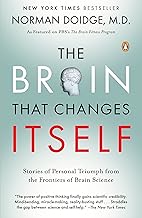
The Brain That Changes Itself: Stories of Personal Triumph from the Frontiers of Brain Science
Norman Doidge
4.7 on Amazon
31 HN comments

Maps of Meaning
Jordan B. Peterson and Random House Audio
4.8 on Amazon
27 HN comments

To Sell Is Human: The Surprising Truth about Moving Others
Daniel H. Pink and Penguin Audio
4.5 on Amazon
25 HN comments

Healing Back Pain: The Mind-Body Connection
John E. Sarno MD
4.4 on Amazon
23 HN comments

Grit: The Power of Passion and Perseverance
Angela Duckworth and Simon & Schuster Audio
4.6 on Amazon
23 HN comments

Nutrition and Physical Degeneration
Weston A. Price and Price-Pottenger Nutrition Foundation
4.8 on Amazon
17 HN comments

The Complete Guide to Fasting: Heal Your Body Through Intermittent, Alternate-Day, and Extended Fasting
Dr. Jason Fung and Jimmy Moore
4.7 on Amazon
13 HN comments

Tribe: On Homecoming and Belonging
Sebastian Junger and Hachette Audio
4.6 on Amazon
13 HN comments

The Happiness Trap: How to Stop Struggling and Start Living: A Guide to ACT
Russ Harris and Steven C. Hayes PhD
4.6 on Amazon
13 HN comments

The Immortal Life of Henrietta Lacks
Rebecca Skloot
4.7 on Amazon
12 HN comments

On Killing: The Psychological Cost of Learning to Kill in War and Society
Dave Grossman
4.7 on Amazon
12 HN comments

Leaders Eat Last: Why Some Teams Pull Together and Others Don't
Simon Sinek and Penguin Audio
4.7 on Amazon
11 HN comments

Radical Acceptance: Embracing Your Life with the Heart of a Buddha
Tara Brach, Cassandra Campbell, et al.
4.7 on Amazon
11 HN comments

The Magic of Thinking Big
David J. Schwartz
4.8 on Amazon
11 HN comments

The Laws of Human Nature
Robert Greene, Paul Michael, et al.
4.8 on Amazon
10 HN comments
masklinnonJune 6, 2016
tlowrimoreonFeb 1, 2010
nv-vnonOct 30, 2015
bhermsonDec 29, 2010
http://www.amazon.com/Immortal-Life-Henrietta-Lacks/dp/14000...
pixelbreakeronJuly 6, 2020
pacaroonNov 28, 2012
eldudeonJune 13, 2013
Another excellent book on the ethics of bio-engineering and patentability is the true story, "The Immortal Life of Henrietta Lacks."[2]
[1] http://en.wikipedia.org/wiki/Next_(novel)
[2] http://www.amazon.com/The-Immortal-Life-Henrietta-Lacks/dp/1...
gotaonDec 18, 2018
I'd love to recommend "Abusado", by brazilian journalist Caco Barcellos, but unfortunately it does not seem to be available in English
[0](https://en.m.wikipedia.org/wiki/The_Immortal_Life_of_Henriet...)
araneaeonDec 29, 2010
The contribution of HeLa cells to modern biology is simply unfathomable. They were the first cells to be cultured and the only ones that could be for many years. If it weren't for them, modern biology would have been pushed back many, many years. Every person who has ever been through public schooling should know her name. Which is why I was so happy Skoot wrote this book, because now more people do.
nollidgeonOct 31, 2012
There's also lots of blogs written by laypeople or former researchers who carefully distill and contextualize individual scientific papers, such as many of the folks at Discover Magazine blogs (Phil Plait, Ed Yong).
Moreover, there's a larger problem of lay journalists, public, and many university PR people treating every bit of research as a groundbreaking answer to a huge question, when the reality is that each paper is merely a bit of dialog in a massive conversation about the nature of our universe. This leads the public to become rightfully distrusting of the massive overstatements, and therefore tragically disinterested in the nuanced conversation behind it all.
So perhaps the single best thing to do is become part of the conversation! Follow authors and bloggers on social media, talk to your friends in science, furrow your brow at bombastic university press releases and seek the nuance. This will lead you to the best books, articles, and science communicators out there.
mlichtensternonSep 27, 2014
"On the Origin of Species by Means of Natural Selection, or the Preservation of Favoured Races in the Struggle for Life"
“At some future period, not very distant as measured by centuries, the civilised races of man will almost certainly exterminate and replace throughout the world the savage races. At the same time the anthropomorphous apes, as Professor Schaaffhausen has remarked, will no doubt be exterminated. The break will then be rendered wider, for it will intervene between man in a more civilised state as we may hope, than the Caucasian and some ape as low as a baboon, instead of as at present between the negro or Australian and the gorilla.”
araneaeonDec 29, 2010
For one, one man did, but he was a con artist that made the family hesitant to ever talk to anyone again. When Rebecca Skoot went to interview the family for the book, they accused her of being his crony. It took her 10 years to write this book, partly because it took that long for them to open up to her.
The other half of the reason is that lawyers have, and they've gotten nowhere. There's actually a rather long legal precedent in the U.S. that the tissue taken from a person in the course of a medical treatment doesn't belong to them. It is considered medical waste, and part of the argument is that restricting its usage would hurt medical progress. This is why it is perfectly legal for hospitals to sell the foreskin of circumcised infants to pharmaceutical companies, for instance.